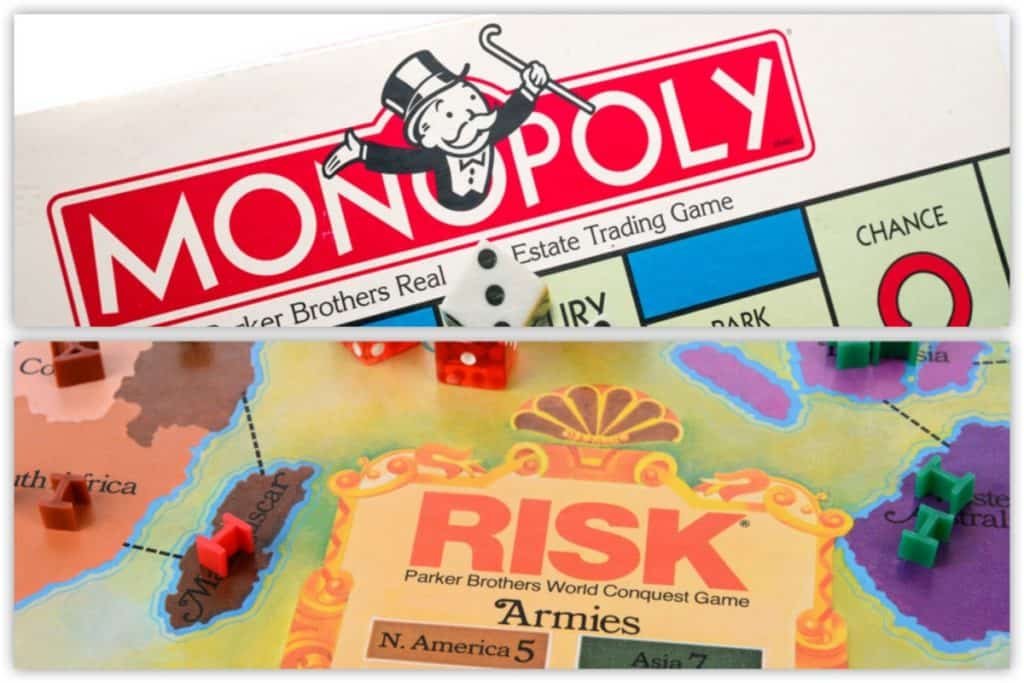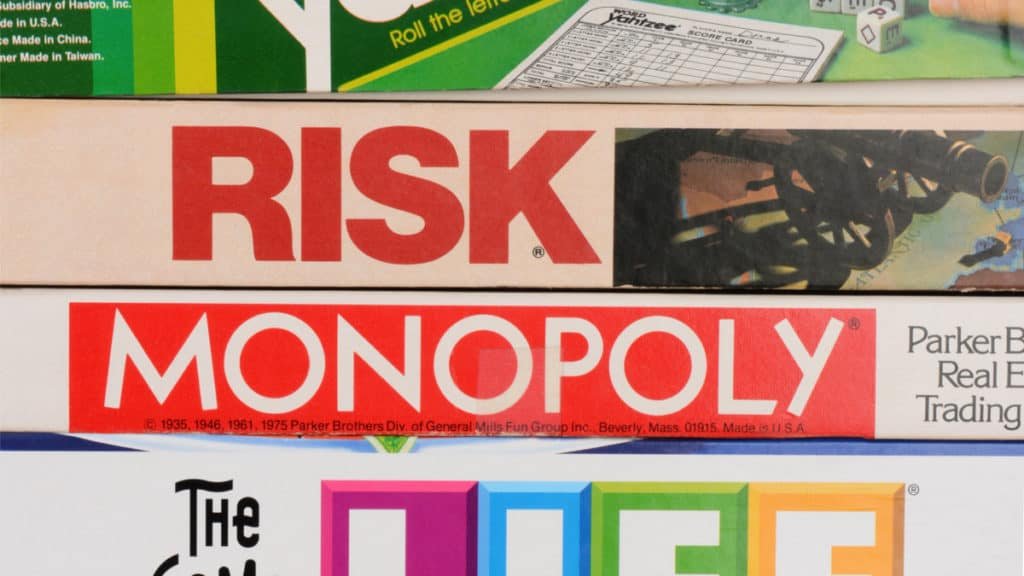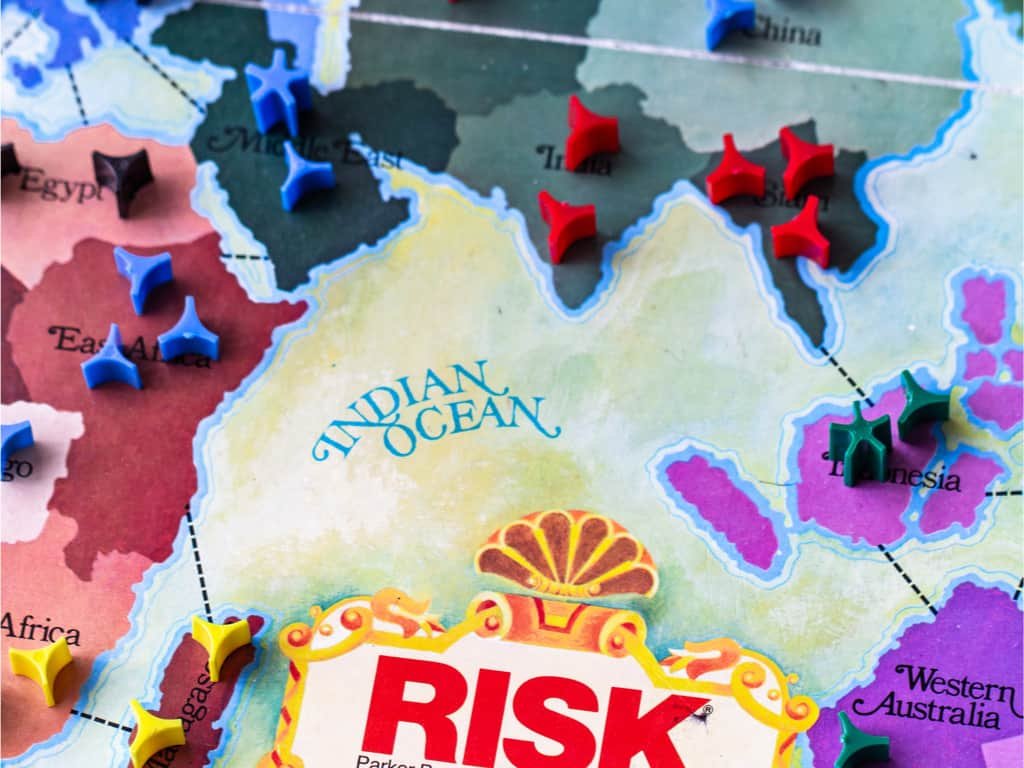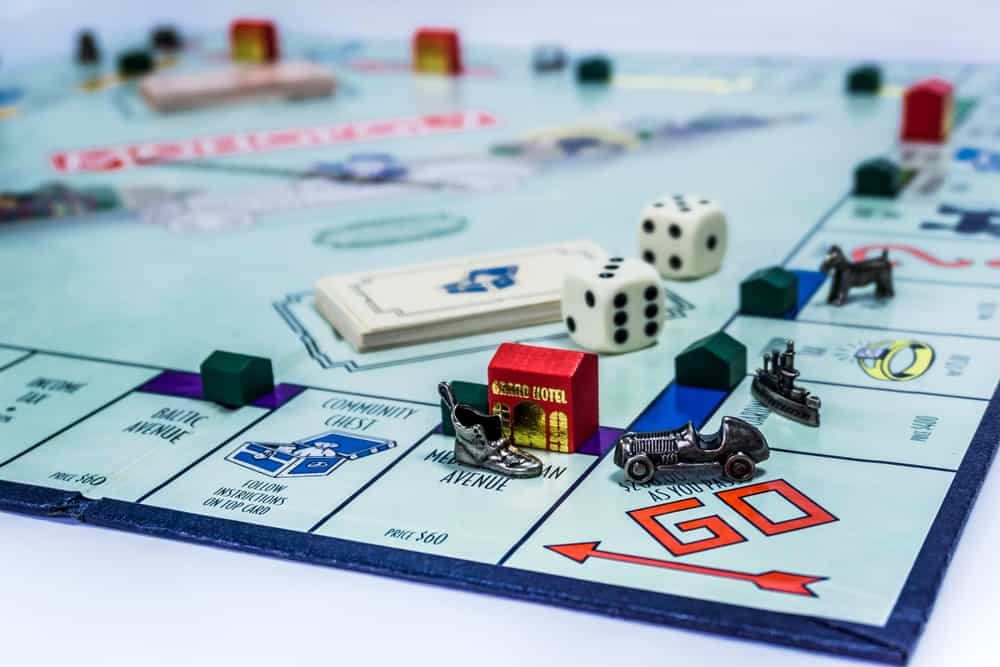Last Updated on January 7, 2024 by Gamesver Team and JC Franco

While growing up, games night and even family gatherings would get to that moment of chaos where everyone argued over which game to play. Monopoly and Risk were firm favorites, and trying to decide which one to play was almost agonizing for us. Dad always had the final say, but I am sure he struggled to make the choice too. I completely understood – after all, I couldn’t really decide which game was better myself.
This recently got me into thinking about Risk vs. Monopoly and how the games might be the same or different.
Risk vs. Monopoly: Similarities and Differences:
| SIMILARITIES |
| Both games teach real-life skills. |
| Both Risk and Monopoly involved a lot of strategy. |
| Risk and Monopoly both focus on “taking over” or dominating an area/territory. |
| Alliances can be struck up in both games. |
| In both games, the outcome is influenced by chance. |
| DIFFERENCES |
| Risk can take 1 to 8 hrs to play, whereas Monopoly is meant to take 60 to 90 mins. |
| In Monopoly, money is earned, whereas, in Risk, no money comes into play. |
| The gameplay of both games is quite different. Risk involves taking over territories at will, whereas Monopoly requires players to work their way around a board. |
While Risk and Monopoly are similar games in some respects, it is difficult to overlook just how different they are too. If you have taken an interest in learning how these 2 games compare, perhaps it is time to learn more.
To learn more, you have come to just the right place. Read on below to take a closer look at the similarities and differences of Risk and Monopoly listed above.

How Risk and Monopoly are Similar
In all the years that I have been playing both Risk and Monopoly, I must admit that the similarities are quite obvious. I never really focused on them, but now that I have been giving them some thought, it is hard to dispute the similarities. Someone who has never played either game or only played only one of them might wonder how that can possibly be true. But, the reality is that it is true.
Just because the game board and playing pieces look different, it does not mean that they are all that different when it really comes down to it. Let us take a look at the 5 ways in which Monopoly and Risk are similar.
1. Both games teach real-life skills.
If you are looking for board games that teach strong life skills to children, you cannot go wrong with either of them. Monopoly and Risk teach people the importance of forethought, the reality of action and consequence, the importance of patience, and the ability to think strategically. Managing resources, being insightful, and making purposed decisions are also life skills that come through in both Monopoly and Risk.
If you would like to build a solid foundation with your children in respect of the above-mentioned skills, playing board games such as Risk and Monopoly is a great way to start.
2. Both Risk and Monopoly involved a lot of strategy.
Of course, both Risk and Monopoly lean somewhat on the luck and chance side of things. However, if players want to get ahead in either game, they have to have a specific skill…and that is the skill of strategy. Strategy is something that can be developed over time. It is a way of thinking and a way of acting/reacting. Players need to apply strategic thinking and strategic actions to their gameplay in order to actually get ahead and win.
3. Risk and Monopoly both focus on “taking over” or dominating an area/territory.

Risk is a game that is all about dominating and holding territories on the world map. The more territories that a player owns, the more likely they are to win the game. It is much the same with Monopoly. The objective of Monopoly is to own as much as possible on the board (real estate) and to generate the most amount of money. A player that is able to buy up most of the board’s property is the player that will most likely win. Because of this, Monopoly and Risk are very similar in terms of dominating or taking over an area.
4. Alliances can be struck up in both games.
If you want to win in Monopoly but see another player getting a stronger foothold on properties and earning more than their share of income, it is time to ally with other players to deter their progress. Much the same, you can ally with other people in Risk to deter the advancement of a certain player’s troops on the board. In both games, their alliances are temporary and just set in place to overcome a common “enemy”.
5. In both games, the outcome is influenced by chance.
You can be a highly skilled Monopoly player or Risk player, but the outcome of the game is somewhat influenced by chance. Both games require strategy, but both games involve the dice’s rolling, which means that certain moves and “decisions” are left up to chance.
How Risk and Monopoly are Different
It is hard to think that games that can have so many similarities can actually be different too, but that is precisely the case with Risk and Monopoly. I have found that the 2 games are different in a number of ways. Let us take a look at 3 ways in which Monopoly and Risk are similar.
1. Risk can take 1 to 8 hrs to play, whereas Monopoly is meant to take 60 to 90 mins.

The amount of time that it takes to play both board games is quite different. For some, Monopoly is a game with no definite end, and when you play with kids, this can be troublesome. In my house, there is no such thing as playing a “quick” round of Monopoly. Yet, in reality, a Monopoly game is meant to go for around 60 to 90 mins.
When it comes to Risk, the gameplay can take anything from 1 to 8 hours to complete. If you are playing the game languidly as we did in my family home, then the game can take a few days to play – sometimes an entire weekend. After doing some research online, I found out that professional and competitive Risk players generally finish the game quite quickly. One of the longest competitive game of Risk ever played is recorded to be under 3 hours. I must admit that that is not very long at all in terms of board games gameplay.
2. In Monopoly, money is earned, whereas, in Risk, no money comes into play at all.
When it comes to the differences between the 2 games, money is an obvious one. It’s not that there’s a difference in cost between the 2 games – there probably is – it is more about the involvement of money in the game.
Monopoly is a very money-oriented game. The main objective is to earn as much money as possible. The player with the most money, in the end, will win.
Risk is quite different in that there is no money involved in the gameplay at all. Players are focused on dominating territories, and money plays no part whether a player wins or loses.
3. The gameplay of both games is quite different. Risk involves taking over territories at will, whereas Monopoly requires players to work their way around a board.
When you watch a game of Monopoly and Risk being played, or even play a few rounds yourself, you will notice that the actual gameplay is quite different. Monopoly follows a more traditional gameplay where players follow a track around the board. Risk, on the other hand, is quite different in that players must aim to take over territories that they covet, which means that movement around the board is far more erratic and at will. When it comes to it, both Risk and Monopoly are very different.
In closing
When it comes to choosing between Monopoly and Risk, all you have to do is take a look at the similarities and differences and decide what “mood” you are in. If you feel like playing an intense strategy game that requires a bit of planning and forethought, Risk is the game for you. If you want a more lighthearted and traditional game, Monopoly is the game for you. Of course, you could always just flip a coin to decide….or why not play both?

